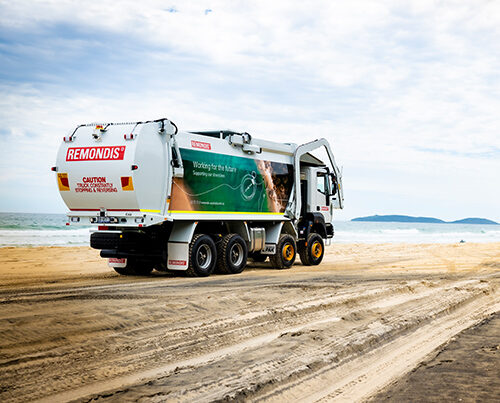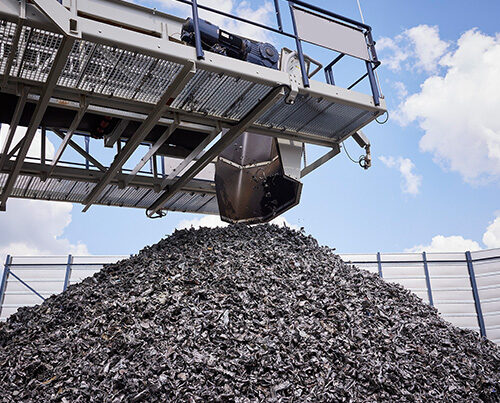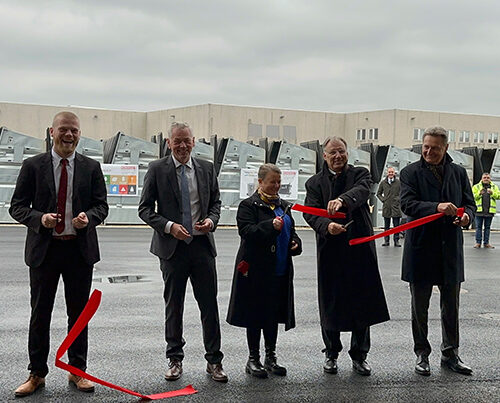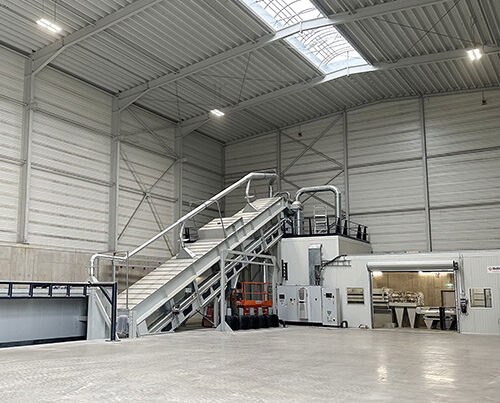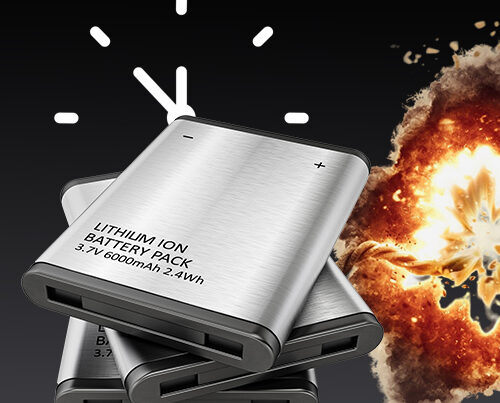They love the colour orange and their royal family, are experts at making cheese and liquorice and are true masters when it comes to building dykes. And the Dutch football team has been one of the best in Europe for many years now. What apparently spurs the players on to achieve their best performance in the stadium effectively symbolises the attitude of the entire country. Determined and full of ideas, the Dutch are leading the way in a whole host of different areas – as can be seen by their efforts to set up a future-proof circular economy. Hup Holland Hup!
The Netherlands is leading the way in Europe in a whole range of areas with its innovative pilot projects. These include, for example, its nappy recycling facility in Weurt, its deposit return scheme for drinks packaging (where drinks bottles and cans remain the responsibility of the producers) and its carbon capture systems at waste-to-energy plants that enable the gas to be used as a fertiliser on farms. “The Netherlands is playing an active role in driving forward the transition towards a circular economy,” said Dr Andreas Krawczik, managing director of REMONDIS Nederland B. V.
The Netherlands has included all sectors in this process: waste segregation and recycling schemes, sustainable product design, a green, sustainable industry, a circular economy in the construction and housing sectors, a circular agricultural sector, digital technologies to improve the traceability of materials, and new business models such as a ‘sharing economy’ and take-back programmes.
In a nutshell
The Netherlands are spearheading the way in the circular economy: they are setting the standards with their many projects that include nappy recycling, deposit return schemes for drinks packaging and carbon capture systems at their waste-to-energy plants. REMONDIS Nederland B.V. is also helping to drive forward this transition with its innovative waste segregation schemes, digital traceability systems and comprehensive producer responsibility schemes. The use of virgin raw materials, such as sand, wood and metal, should be halved by 2030.
Furthermore, there are a host of political and statutory measures on the agenda, such as subsidies, regulations and public awareness campaigns focusing on sustainable consumption. “As far as we are concerned, modern waste management means restructuring the traditional model of producing, using and disposing of products to make it more sustainable and resource friendly,” Dr Andreas Krawczik stressed.
“The use of virgin raw materials, such as sand, wood and metal, should be halved by 2030.”
Dr Andreas Krawczik, REMONDIS Nederland B.V.
Working together to grow sustainability
REMONDIS Nederland operates in the Netherlands alongside the other RETHMANN Group companies: Transdev, SARIA and Rhenus Logistics. A player on the mobility market, Transdev is parent company to various transport firms in the Netherlands – from public transport, to taxis and self-driving shuttle buses, through to ambulances. Last year, Transdev was awarded Level 5 certification of the CO2 Performance Ladder, one of the Netherlands’ sustainability instruments. 5 is the highest level that can be reached. More and more of Transdev’s fleet is zero-emission and in Eindhoven it runs one of the world’s cleanest bus networks. The town is the European competence centre for electromobility.
Rhenus Logistics,
which has over 35 business locations in the Netherlands, specialises in national and international transport, multi-modal services and integrated logistics. Its logistics centre in Tilburg is one of the world’s most sustainable logistics centres. Nominated for the Breeam Award in 2019, this centre’s solar system, rainwater harvesting system for flushing toilets, and high-performance façade insulation all ensure it achieves top energy efficiency levels. Efficient charging stations have been installed at many of the company’s sites so that EVs can be recharged. In 2022, Rhenus was awarded Gold Status by EcoVadis, a provider of business sustainability ratings. This puts Rhenus in the top 1% of all the service providers assessed within the logistics sector.
SARIA
is a service provider and manufacturer of high-quality products for the agricultural and energy sectors, the food processing and animal feed industries, and the restaurant and pharmaceutical sectors and carries out a wide range of activities in the Netherlands. The Van Hessen division, one of the leading global players in the production and distribution of natural casings for the sausage industry, has implemented a major sustainability project at its headquarters in Nieuwerkerk aan den IJssel. 1,262 solar panels on the roofs of the site generate electricity – up to 500,000 kilowatt hours. The SARIA divisions ReFood, Devro and SARVAL also have branches in the Netherlands.
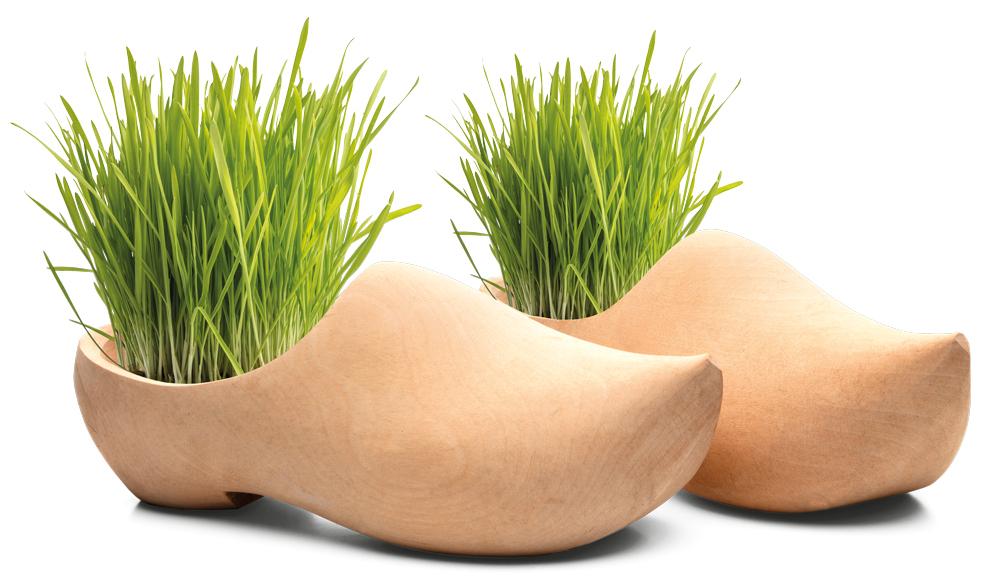
A nationwide programme for the circular economy
The Netherlands has set itself some ambitious goals: material life cycles should be closed by 2050. “Moreover, the use of virgin raw materials, such as sand, wood and metal, should be halved by 2030,” explained Dr Andreas Krawczik. The Dutch government is collaborating with companies and science institutes to drive forward innovations in the areas of circular production and circular consumption.
These include, for example, the government-wide programme for a circular economy which was introduced in 2016 and given the title: ‘A Circular Economy in the Netherlands by 2050’. The Dutch government was, therefore, one of the first in Europe to adopt the EU’s 2015 European Circular Economy Action Plan (CEAP). This was then followed by the ‘Transition Agenda Circular Construction Economy’ in 2018, which stipulates that the construction sector must be made fully circular, in three steps, by 2050.
Good waste segregation, high recycling rates
A number of things are done differently in the Netherlands compared to other European countries. “We have the highest recycling rates in Europe,” Dr Andreas Krawczik reported. Around 60% of household waste is recycled. The EU average for this particular waste stream lies at around 47%. “We are able to reach this figure by motivating local inhabitants to separate their waste carefully and reduce their volumes of waste.” 24% of Dutch districts had a waste segregation rate of 75% in 2022, compared to just 7% in 2015. Between 2015 and 2022, the volumes of residual waste fell from 240 kilos to 163 kilos in over 26% of the districts in the Netherlands. On average, every Dutch resident produces 460 kilos of waste. The European average lies at 489 kilos per capita per year.
The Netherlands is also leading the way when it comes to handling construction and demolition waste. More than 90% of the country’s construction and demolition waste is reused. “Dutch firms are spearheading the way with their innovative methods of reusing materials,” Dr Andreas Krawczik continued. Businesses such as ‘Waste2Wear’ and ‘Plastic Whale’ make textiles and furniture from recycled plastic. Projects, such as ‘Textile Links’, promote the reuse of clothes and textiles on a grand scale. “Materials like concrete and asphalt are reused in new infrastructure projects.” This also includes using them as aggregate to build new roads. It is both usual and possible for all asphalt plants in the Netherlands to include up to 50% recycled asphalt in their products.
The circular economy in the housing sector
Covering a surface area of 37,391km², the Netherlands is one of the smaller countries in Europe. Having said that, it is one of the most densely populated regions (533 inhabitants per square kilometre) and has a strong economy. It has been estimated that the country will need to build a million new flats and renovate its existing housing stock over the next ten years – while at the same time aiming to reduce its carbon emissions.
As is the case in other European countries, the housing sector will play a key role as countries head towards becoming net zero. Compared with all the other industries, the construction sector in the Netherlands makes up 50% of its raw materials consumption, 40% of its energy consumption, 35% of its carbon emissions, 30% of its water consumption, and 50% of construction and demolition waste. During an interview with NAX (Network for Architecture Exchange), Torsten Schröder from Eindhoven University of Technology said that this all means that the transition towards a circular economy requires a radical change in the way houses are designed, built, used and demolished.
The ‘Transition Agenda Circular Construction Economy’ is, he said, a key initiative for many more measures and initiatives as the country transitions towards a circular construction sector. The ‘Milieu Prestatie Gebouwen’ (MPG) was introduced in 2018, which enables the environmental performance of new buildings to be calculated. This environmental impact assessment of a building is mandatory to receive building permission. The result of this assessment is the so-called shadow cost of constructing a building which is based on eleven environmental impact categories – including the mining of abiotic raw materials and fossil fuels, global warming, depletion of the ozone layer, human toxicity potential and aquatic impact. Torsten Schröder concluded that the introduction of this MPG score has promoted the use of bio-based construction materials and awakened interest in reusable building parts. Despite all this, however, there has not been a reduction in the use of raw materials. Binding agreements are needed to bring about this transition – to make the use of resources radically more efficient and for such efficient use to be more widespread. What’s more, as it heads towards becoming a circular economy, the European construction sector must also focus on converting and renovating its current housing stock, as these buildings have a greater impact on the environment.
Verpact implements extended producer responsibility
On 01 January 2024, the four companies Stichting Afvalfonds Verpakkingen, Kennisinstituut Duurzaam Verpakken (KIDV), Nedvang and Stichting Nederland Schoon merged to create the Verpact organisation. This organisation represents manufacturers and importers operating in the packaging industry and is dedicated to implementing extended producer responsibility (EPR). Verpact deals with the collection, sorting and marketing of the segregated wastes, including the management of the deposit return scheme. One of Verpact’s tasks – as part of EPR – is to inform the Government once a year about its achievement of the recycling targets. Thanks to this collective initiative, the country has avoided there being a patchwork of individual different systems. The amount that companies must financially contribute towards their packed products depends on the complexity of the packaging. The levies on recyclable packaging are lower than those on non-recyclable ones. This should motivate producers and consumers to make circular decisions, promote reuse and reduce waste and microplastic. It is not possible to simply replicate this central system operated by Verpact – which has proven to be well worth its while in the Netherlands – in other European countries.
Prevention & recycling rather than landfill
“Waste management companies in the Netherlands operate in line with the waste hierarchy according to ‘de ladder van Lansink’,” explained Dr Andreas Krawczik. This means that priority is always given to waste prevention and reuse ahead of recycling and thermal treatment. Extended producer responsibility (EPR) applies in the Netherlands just like Germany. Producers are responsible for the entire life cycle of their products – from the production process through to ensuring they are returned and recycled. The EPR applies to manufacturers and importers of electrical and electronic equipment, batteries (single use and rechargeable) as well as plastic packaging, textiles, mattresses and car tyres.
Less than 1% of combustible municipal and commercial waste is still being sent to landfill in the Netherlands. “The country runs a strict anti-landfilling policy that is implemented by imposing high landfill levies and a ban on landfilling reusable and combustible materials,” commented Dr Andreas Krawczik. Non-recyclable materials are processed at waste-to-energy (WtE) plants. REMONDIS Nederland owns a 49% share in the ARN B.V. WtE plant in Weurt near Nimwegen. The electricity and heat generated there are supplied to local households and businesses. The Netherlands is also leading the way here when it comes to cleaning flue gases and recycling incinerator bottom ash (IBA).
A strict packaging ordinance & ban on single-use plastic
The Netherlands enacted a new packaging ordinance on 01 January 2023. This stipulates that responsibility now lies with the brand owner and no longer with the producer. Empty service packaging, such as chip trays and coffee cups, is no longer the responsibility of the company placing it on the market – e.g. fast-food restaurants – but of the producer of the empty service packaging. Plastic packaging must be registered and a financial contribution paid for them. An additional regulation was brought in for single-use plastic in January 2024. This affects diverse single-use plastic products that may no longer be used, for example, at take-away restaurants. Moreover, a further regulation came into force at the same time banning the use of microplastics in cosmetic products.
According to the latest reports, there will be a considerable increase in carbon capture in the Netherlands over the coming years.
Carbon capture – a scenario for the future
The Dutch government is supporting carbon capture and storage (CCS) with subsidies such as its SDE++ scheme as part of its programme to reduce its carbon emissions and reach its climate goals. Various CCS systems have been planned across the industrial sector. Waste-to-energy plants are also eligible for funding. The recovered carbon dioxide is supplied, for example, to farmers as a fertiliser for their greenhouses. If the right dosage is used, then this carbon fertiliser can accelerate and strengthen tomato, cucumber and lettuce growth by up to 20%. “According to the latest reports, there will be a considerable increase in carbon capture in the Netherlands over the coming years. Plans are for huge volumes of CO2 to be stored in the country’s old gas storage tanks in the future. It has been estimated that CCS systems will capture over 22 megatonnes by 2030 and over 50 megatonnes by 2035. WtE plants will be contributing towards these volumes.”

A comprehensive waste segregation system
Separating waste is hugely important in the Netherlands. There are segregated collection schemes for paper, glass, plastic packaging, drinks cartons and cans (PMD), textiles, and vegetable, fruit and garden waste (VFG) as well as small amounts of chemical waste, which residents can hand in to their local household waste recycling centres. As set out in the country’s new and stricter packaging ordinance (which came into force at the beginning of 2023), different kinds of plastic packaging must be registered and a financial contribution paid for them. Since July 2023, Dutch customers, for example, must pay a fee for the single-use plastic containers they use for to-go products. An additional regulation was brought in for single-use plastic in January 2024. This has led to diverse single-use plastic products no longer being available in shops and being replaced with environmentally friendly, reusable alternatives. “The ‘Plastic heroes’ initiative also promotes the collection of plastic waste. Thanks to these collections of cleanly separated plastics, the volumes of plastic packaging being recycled have increased significantly.”
As part of the ‘Inzamelhelden’ initiative, REMONDIS collects recyclable materials from shops and offices located in the centre of Delft, Enschede and Zwolle using electric cargo bikes. “A number of Dutch towns have made their city centres zero-emission zones. By taking part in this initiative, we can show them that we are a good partner for these areas as well,” Dr Andreas Krawczik concluded.
REMONDIS in the Netherlands
REMONDIS Nederland B.V. has been operating in the Netherlands since 2006. Its 52 branches employ over 1,800 people. REMONDIS Nederland runs hazardous waste collection and transhipment centres (REMONDIS Gevaarlijk Afval) in Lichtenvoorde and Amersfoort. Moreover, it also has REMONDIS Smart Infra with RRS, and RETERRA for organic waste. The company owns a 49% share in the ARN B.V. WtE plant in Weurt near Nimwegen. Its nappy recycling facility is also located in Weurt. REMONDIS Nederland operates a timber processing plant and mixed construction waste sorting facility in Son that is able to separate recyclables into 21 individual categories. Furthermore, the company runs a paper processing plant in Wognum together with HVC.
Shared responsibility
The Netherlands has a deposit return scheme for plastic and glass bottles. This is implemented by the Verpact organisation, created as the result of a merger between four firms on 01 January 2024. “What’s unusual here is that the producer remains the owner. This means that the returned products may not be marketed by those taking them back,” explained Dr Andreas Krawczik.
REMONDIS Nederland is a partner of Open Waste – a collaboration between 14 Dutch waste management companies that otherwise compete with each other. “It’s all about cutting carbon emissions in town centres. The collection of waste from businesses is organised and managed centrally as part of the ‘Green Deal Zero Emission Stadslogistiek’ and carried out using neutral refuse collection vehicles.
This reduces traffic, noise and emissions in town centres. These collection vehicles will be replaced with electric or hydrogen-run ones as soon as possible.”
All of the initiatives, collaborations and plans described here show that the Netherlands operates a robust waste management sector fit for the future and is well prepared for any challenging tasks it may have to face. “Thanks to our strong focus on innovation and sustainability, REMONDIS Nederland will continue to systematically drive forward developments, roll out digitisation, and work with our customers and partners to set up a circular economy for all types of waste,” Dr Andreas Krawczik concluded.
Image credits: image 1: Adobe Stock: LukaszDesign; image 2, 5: Adobe Stock: by-studio, womue; image 3, 4: Adobe Stock: Zarya Maxim







